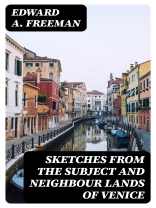In ‘Sketches from the Subject and Neighbour Lands of Venice’ by Edward A. Freeman, readers are treated to a collection of vivid and detailed literary sketches that provide a unique glimpse into the subject and neighbor lands of Venice. Freeman’s writing style effortlessly combines historical accuracy with engaging storytelling, offering readers a rich tapestry of the cultural and geographical context of the Venetian region. With meticulous attention to detail and evocative descriptions, Freeman transports readers to a bygone era of grandeur and intrigue, making this book an essential read for history enthusiasts and armchair travelers alike. Edward A. Freeman, a renowned historian and scholar known for his expertise in European history, brings his vast knowledge and passion for the subject to bear in ‘Sketches from the Subject and Neighbour Lands of Venice.’ His deep understanding of the historical and cultural significance of Venice shines through in every page, making this book a valuable addition to the library of anyone interested in Italian history or the Renaissance period. I highly recommend ‘Sketches from the Subject and Neighbour Lands of Venice’ to readers eager to explore the rich tapestry of Venice’s past and its neighboring lands, as Freeman’s expertly crafted sketches offer a captivating glimpse into this fascinating region.
A propos de l’auteur
Edward Augustus Freeman (1823–1892) was an eminent English historian, architectural historian and commentator, known for his meticulous research and a prolific literary output. His scholarly style blended comprehensive narrative with insightful analysis, making him a respected figure in the Victorian intellectual landscape. Freeman’s historical perspective was characterized by a rigorous attention to original sources, an approach exemplified in his extensive works on the Norman Conquest and European architecture. One such work is ‘Sketches from the Subject and Neighbour Lands of Venice’ which explores the reach and impact of Venetian influence. This book, like much of his work, is noted for its meticulous detail and broad view of historical connections. Freeman’s historiography often traced the development of institutions and architectural styles, rather than merely recounting events, reflecting his belief in the interconnectedness of history and culture. His contributions have been critical in shaping the study of architectural history and medieval European history. Despite the passage of time, Freeman’s work remains a valuable resource for historians and scholars interested in the cultural and historical tapestry of Europe.












